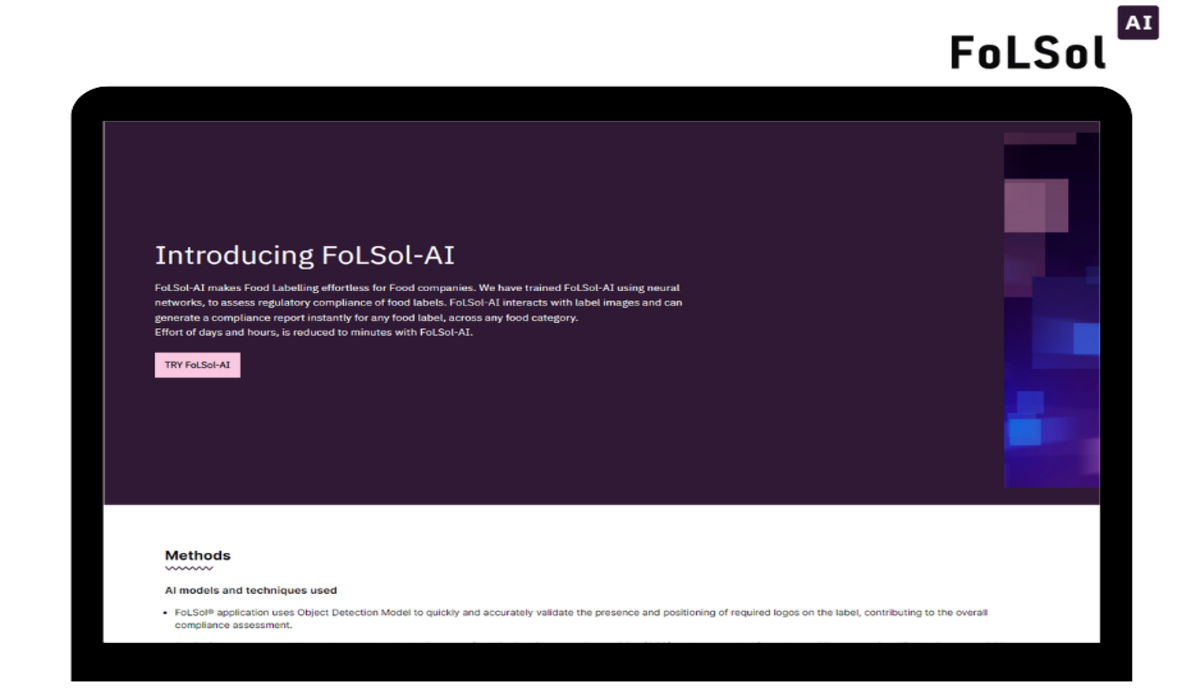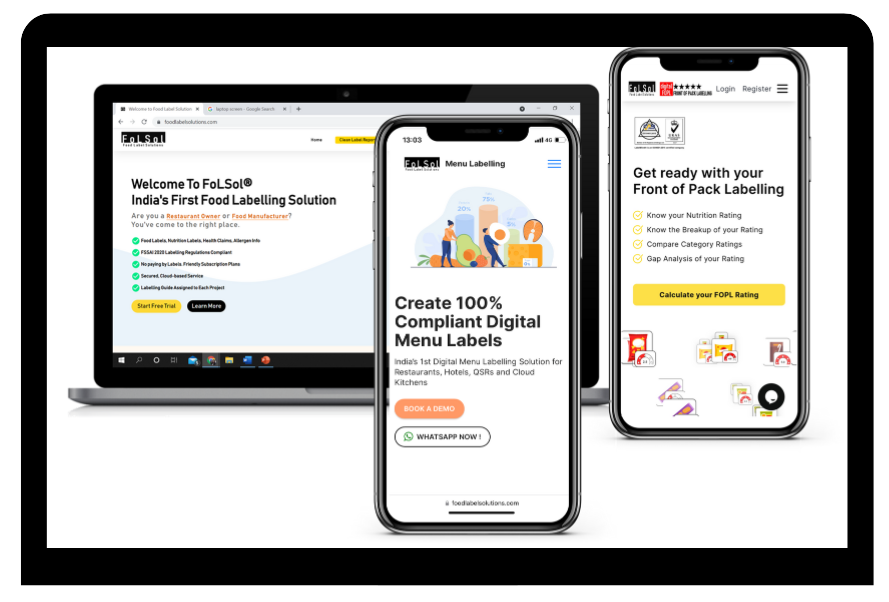From Niche to Mainstream: The Growing Market Potential of AI in Food Labelling regulations
December 26, 2023

In this insightful discussion, we'll explore
How smaller tech companies take on exploratory work in AI-led food labelling to make large food cos. Future-ready
Challenges in building AI systems of food labelling
Opportunities for investing in AI-led food labelling systems
How Smaller Tech Companies Take On Exploratory Work In AI-Led Food Labelling To Make Large Food Companies Future-Ready
In the early days, regulatory teams have toiled over manual inspection and labeling, a cumbersome task ridden with errors. The solution?
Enter Artificial Intelligence.
AI started with basic image recognition, easing the burden on human inspection and validation. As technology advanced, so did Artificial Intelligence. Machine learning evolved, embracing convolutional neural networks and deep learning. This meant intricate features extracted from images, boosting accuracy and speed.
Future Focus
The journey continues towards developing more advanced systems, blending AI seamlessly. Challenges like diverse packaging, regional labelling, and adaptability in dynamic environments are in the spotlight.
Let's shift our focus to the trailblazers—the smaller tech companies shaping the future of AI in food labeling
Agile firms like LabelBlind® tackle exploratory work head-on, embracing the challenges and opportunities that come with it.
While smaller firms explore uncharted territories, large food corporations’ benefit from insights and innovations, seamlessly adopting advanced AI solutions to workflows smarter between cross functional teams.
How Smaller Tech Companies Take On Exploratory Work In AI-Led Food Labelling To Make Large Food Companies Future-Ready
This collaborative model propels the entire industry forward, making large food companies future-ready by leveraging the expertise and ingenuity of their smaller, more agile counterparts.
The benefits are manifold
1. Flexibility for Innovation: Smaller tech companies experiment with the latest AI advancements, pushing the boundaries of technology.
2. Rapid Prototyping: Nimble, Quick iterations based on real-world feedback is essential for robust solutions.
3. Data Challenges: Actively collaborating, ensuring diverse and representative datasets for accurate AI training.
4. Customization Expertise: Tailoring solutions to the specific needs of large food companies with unmatched agility.
5. Proof of Concept: Serving as incubation centres outside of your organisation and yet working to your requirements, demonstrating the viability and potential of AI solutions.
6. Absorbing Costs and Risks: Taking the plunge, absorbing initial expenses and risks, refining solutions before presenting to larger enterprises.
7. Regulatory Navigation: Proactively engaging with regulatory bodies, ensuring compliance with evolving food labeling regulations.
This dynamic ecosystem showcases a symbiotic relationship between smaller tech companies and their larger counterparts.
Challenges In Building AI Systems Of Food Labelling
Welcome to the world of AI in food labeling, where smaller tech companies are embarking on a journey filled with challenges and innovation.
1. Limited Resources
As smaller tech companies take on the task of building AI systems for food labeling, they face a common hurdle—limited resources. Constrained budgets and manpower hinder their ability to invest in extensive research and development
2. Data Accessibility and Quality
Another formidable challenge is the quest for quality data. Acquiring diverse and high-quality datasets for training AI models is no small feat. Smaller companies often find themselves wrestling with the volume and variety needed for robust systems.
3. Technological Infrastructure
Building a robust technological infrastructure is the backbone of AI development. However, for smaller companies, this poses a challenge. Acquiring the necessary hardware, software, and computational resources requires strategic decision-making.
4. Talent Acquisition and Retention
Attracting and retaining top-tier AI talent is a chess game. Smaller companies contend with the challenge of skilled professionals being lured by larger organizations offering them more lucrative salaries and benefits.
5. Scalability Challenges
As demand grows, scalability becomes a critical factor. Smaller companies wrestle with the challenge of scaling up operations to meet the needs of an expanding clientele.
Opportunities For Investing In AI-Led Food Labelling Systems
AI-led food labeling systems are at the forefront of investment opportunities—, where technology meets food safety and regulations, offering a landscape rich with innovation and growth.
1. Impact on Mega industries
Regulatory labelling compliance for consumer safety is of paramount importance for mega industries such as Food and Beverage (est. USD 535b), Nutraceuticals, Health Supplements, Pharmaceuticals and Cosmetics.
2. Market Growth
Demand for precise, transparent food labelling is skyrocketing with regulatory tightening and heightened consumer awareness create a fertile ground for exponential growth in AI-led food labeling systems.
3.Technological Advancements
The evolution is from basic image recognition to deep learning algorithms. Cutting-edge innovations in AI present a unique opportunity to invest in technologies that redefine food labelling compliance and efficiencies.
4. Cost Efficiency and Workflow Efficiencies
Solutions that streamline workflow processes and cut costs and heavy manual effort. AI-led food labeling isn't just efficient; it's a strategic investment in a high growth food industry.
5. Customization for Diverse Industries
Explore opportunities in customization as AI taps into diverse industries from food to nutraceuticals and health supplements, drugs and pharma, unlocking the potential of solutions tailored to unique regulation landscapes.
6. Global Regulatory Compliance
Navigating the web of global food labeling regulations to ensure compliance and regulatory adherence in pivotal global food markets presents an opportunity that aligns with the harmonisation of food regulatory compliances in global markets.
7. Partnerships and Collaborations
Collaborations between tech companies and food industry giants present compelling integration of AI-led food labeling systems into existing ecosystems.
The stage is set. Opportunities in AI-led food labeling systems are dynamic, diverse, and ready for exploration. As technology reshapes the future of the food industry, we can contribute to a more transparent and efficient food ecosystem that is sustainable for long term growth.
Join us, as we redefine the way you approach food regulatory labeling. Embrace AI-led food labelling for efficiency, accuracy, and innovation for an on-the-go tech development that is agile to business requirements.
Get your first AI solution developed with LabelBlind®.
Labelblind® Saas Solutions For The Food Industry
Among our standout SaaS solutions are:
1.FoLSol® AI Label Validation

These offerings are promises to revolutionize how companies approach food labelling regulation compliance.
We're not here to present a product; we're here to invite you to be part of a labelling workflow SaaS movement to shape the future of food industry compliance together.
It is a positive disruption and innovation to liberate food companies from time-consuming, slow and manual processes.
We have trained FoLSol-AI® using neural networks, to assess regulatory compliance of food labels. FoLSol-AI® interacts with label images and can generate a compliance report instantly for any food label, across any food category. Effort of days and hours, is reduced to minutes with FoLSol-AI®.

Rashida Vapiwala (Founder at LabelBlind®, Food Label Specialist, Ph.D (Food Science and Nutrition))
Rashida is passionate about solving problems for the food industry using technology. She loves creating tech-led solutions in the space of Nutrition.
